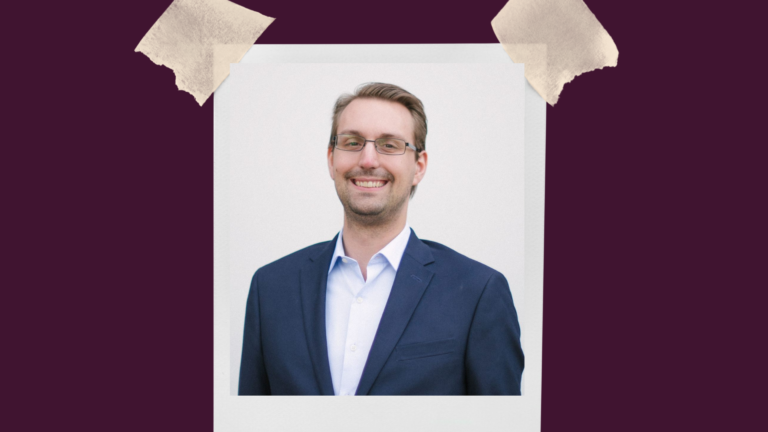
Superstar of the Month: Elliott Jacksch Shares His Top Tips for a Successful Dynamics 365 Functional Consultant Career
- November 16, 2021


Marketing Manager at Domain 6 Inc.
VC: Hi there, Elliott! Thank you for agreeing to sit down with me and have a chat about your career path at Domain 6. Let’s just give everyone a bit of a background about you. How long have you been at Domain 6 and how did you get into software development in general?
EJ: Hi Val! Yes, very happy to share! I graduated from the University of Alaska with a Bachelor’s Degree in Math and at that time I thought I will go into academia and teach math but then I quickly realized I am not super interested in that. So then I decided to go down to Seattle and see if I can get a tech job. After some networking, I met Salim Faroukh ( Founder at Domain 6 ) and he really got me excited about the software industry and offered to join the team in 2018. I started with no experience in Dynamics 365 but given a great mentorship, I picked up pretty rapidly and jumped into customer implementations within the first 6 months. As I gained more experience in the field I started taking more of a lead role in CRM implementations.
VC: That’s a very rapid turn and what an exciting partnership it turned out to be. What would you say was a trigger for you to join Domain 6 and not some other tech company in Seattle?
EJ: Well, essentially after working for some time at Starbucks corporate office in the IT department, I realized that I wanted to try working for a startup. I value people more than titles and I was looking for a closer, more meaningful connection with my colleagues. And so just knowing that I was going to be able to work with interesting, hilarious, very highly driven, very passionate people who really have each other’s back – that I would say was the main reason why Domain 6 and that is what makes me want to stay.
VC: Interesting. It was very similar for me and I think it is what millennials are looking for in general now, right? Our generation is looking for a career path that allows you to feel like a part of something great and not just a piece in a big machine. Paycheck motivation is way outdated. It still definitely plays a role but work-life balance becomes more and more important.
EJ: I agree. And the way I think about it is that being able to have fun at work and do exciting things helps me to become a better, healthier person in my personal life. I don’t treat work as punishment anymore. And it works vise versa. The more comfortable I am at home, the better work I can do during the day. One of the other things I love about a small company too is that it’s a real variety of work that you end up doing from day to day. For example, even though I’m a CRM developer I get to help my colleagues with other IT-related tasks and I love doing that. Being able to add value to the entire company beyond just billable client work is really rewarding for me.
VC: You have mentioned the ability to balance out your personal and work life and to focus on both. I was wondering if you have some tips for being focused and organized in general? Especially now with a lot of team members working remotely?
EJ: To be honest I am a little bit ADHD as an individual, so focus is not necessarily my strong suit all the time. There are total tradeoffs coming with that, such as the ability to switch rapidly between tasks. Getting tasks done though is critical, so I have my Microsoft OneNote checklist always running. When I start a new project and it comes to organizing my thoughts, I use PowerPoint to visually map out how all the different components work together. If I am on the go and I just think of something, I email myself to make sure I do not lose a thought. And Outlook becomes smarter and smarter. I get that Cortana daily update when it analyses my emails and suggests the tasks that I promised to deliver to someone or someone owes to me. Really helpful!
VC: Thank you! I might start using OneNote as well 
EJ: Being around people is such a critical thing for me that I actually fled to Wisconsin to go live with some friends of mine there for a little bit. I really need that face-to-face interaction. However, as far as work goes, we managed to cope pretty well. We implemented bi-weekly virtual happy hour and that did capture the spirit and values of Domain 6, which is to have fun together whether it be through work or whether it be through just human connection. But overall, I would not say that things were too different for me because I made it my priority to reach out to my teammates either through Microsoft Teams or just by phone and make sure that they were in touch and that they felt cared about. So some things definitely changed but we stayed true to our values and made it work.
VC: So true, Elliott! And what I think really helped us to transition is that we were so prepared in terms of all the technology. All of our document management and business processes are fully in the Cloud, so we did not have to go digital overnight as some other businesses had to.
EJ: Exactly! And some people might say that we are just a tech company so we have to be caught up on these things but in reality, we had some key business reasons for doing this and it was that we were highly mobile. Half of our team were constantly flying to NY or California and other places. So we needed to ensure that we have all the right tools in place to help our people succeed.
VC: Talking about success and people enablement. With you being at a relatively early stage in your career, do you feel empowered to achieve your potential? Is there someone at Domain 6 or maybe outside of the team who helped you succeed?
EJ: There’s quite a bit of emotion that comes with that question for me because I’m just so grateful. I mean, when I look back on where I was pre Domain 6 and where I am now, I have definitely grown quite a bit. And one of the things that has been critical for me is the mentorship and it’s actually really hard for me to just pick one or two people because everyone is being engaged and helpful. But for example, Shannon Sullivan and Mike Ramirez taught me everything I know about PM. And that’s been so critical for me because if you understand what your PMs’ needs are, then you can actually craft better documentation as a functional consultant or you can give them better hours estimates, and so on. I’ve learned so much from Salim. I’ve learned so much from senior members of our dev team. I’ve learned so many things from basically every single team member here that it’s essentially the whole company that has helped me get to where I’m at right now.
VC: I love that what you mentioned here made me think about the overall culture at Domain 6. We’ve got that unique group of people who are willing to accept the knowledge and share it with others. And it seems like there are no limits in terms of your job title or something you know. There is never someone too senior to learn from a colleague next to you. Let’s give some “lessons learned” advice to our audience. What would be the top 3 skills that young people need to have to succeed in a functional consultant career?
EJ: One is the ability to abstract. This is the one you don’t hear very often. But the more that I’ve gone into this particular industry, the more critical it’s been. So what I mean by the ability to abstract is the ability to find patterns right across seemingly different entities. Different business processes are often very similar. So, what’s important about that skill is that any time you’re learning something, it’s potentially applicable to everything else you learn which means that you can learn things efficiently. And then additionally it helps you build the software in a way where it’s just configurable to different areas that are basically the same. The second skill is the ability to go down into the weeds of a problem but every once in a while pop up to the high level. And the reason why this is critical is that I’ve seen sometimes that you do not see a high-level picture and changing the question that you are asking can help you solve the problem altogether. And the last skill that I would say is the ability to negotiate, in particular for functional consultants. Because you’re always in between the project manager and the dev team, so to speak. So a lot of what your job ends up being is negotiating on what technical solutions can we provide here that are still in line with the results that are solvable efficiently for the dev but are also good enough for the PM team, what sorts of things can we get that are really solid winds and that very much satisfy the customers and keep them in scope and under budget. It is a constant dance, so learning negotiation skills and tactics is really important.
VC: These are good ones and not trivial at all! And the last quick question. Tell me one fun fact about you that I do not know
EJ: Uhh goodness. Okay. I’m a first-degree brown belt in judo. I obtained that back at high school and I’m also a first-degree brown belt in aikido, which are both Japanese martial arts. So there you go!
VC: That I did not know for sure! Well, I will be careful with you from now on. Just kidding! Thank you so much for your time, Elliott!
EJ: Thank you for having me, Val!
